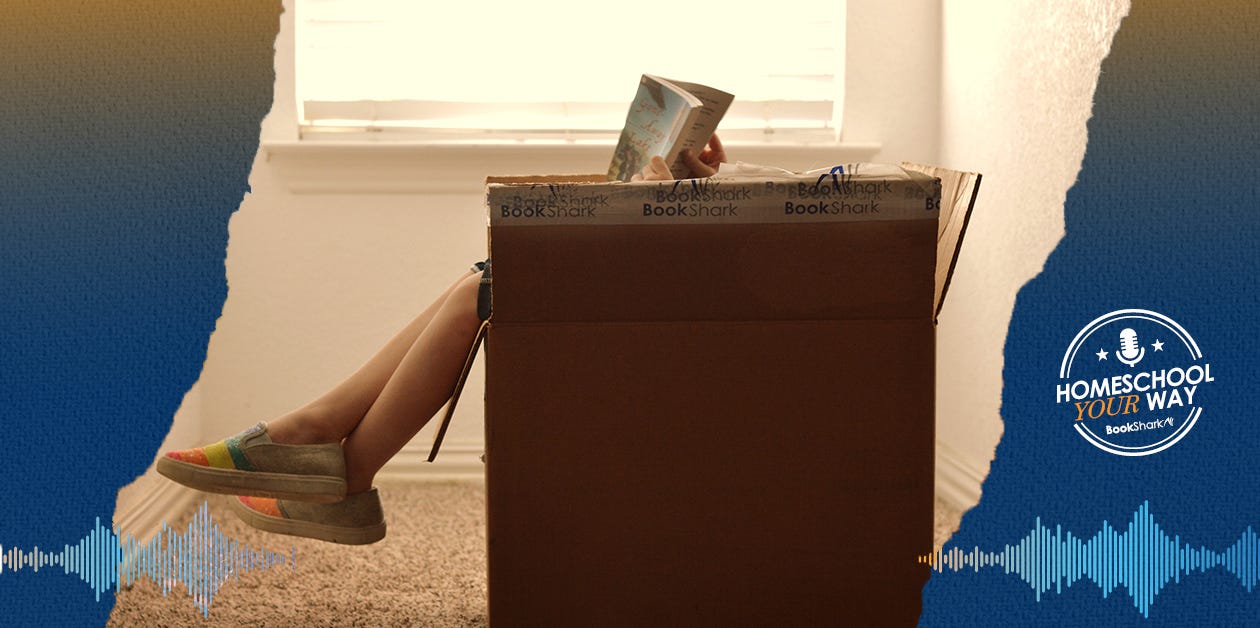How to Handle Math Mistakes
-
 By
BookShark Homeschool Curriculum
By
BookShark Homeschool Curriculum
- Oct 11, 2022

Nicole the Math Lady has a unique approach to math mistakes: When errors happen, instead of feeling like a failure, accept mistakes as part of the learning process. Teach your kids not to be perfect math problem solvers but perfect math fixers. Nicole explains how she uses her own bloopers to encourage kids to embrace imperfection and keep trying.
Listen to this podcast episode
Podcast Transcript
Janna Koch (00:36):
Welcome to Homeschool Your Way. I'm your host and BookShark's Community Manager, Janna Koch. In this episode, I continue talking to Nicole the Math Lady about... Well, you guessed it, math. Nicole's passion for math is contagious, so if you missed the first half of our conversation, visit BookShark.com/podcast to catch up and don't forget to subscribe to ensure that you never miss an episode. Before we get to the beloved topic of math, let me share a homeschool hack. When homeschooling tweens and teenagers, find ways to engage their creativity with creativity. For example, my 13-year-old daughter has recently been in a funk and hasn't used her artistic talents for some time. I've tried numerous ways to encourage her to do something creative, like she used to do all the time. Finally, there was an opportunity to help a local agency that serves foster kids. I thought, "For sure she wouldn't mind me signing her up."
Janna Koch (01:36):
Once again, I was wrong. Instead of giving up or getting mad, I decided she didn't have to show up, but she did have to contribute. She was okay with the compromise. I got the materials necessary to make the project and allowed her to do it on her own, in her own space. Guess what? She worked hard and got it done in record time without complaining, and she was concerned about the results. In my book, that's a win. Are you struggling with your teen? Have you found creative ways to engage their talents? To share, please go to BookShark.com/podcast and leave a comment. I'd love to hear what's worked for you.
Janna Koch (02:18):
Now, let's hear what Nicole does to engage students of all ages to embrace math and the mistakes that come with it. I would ask if you agree with me on this. It seems as though, when we talk about math, and maybe this is why there's a lot of angst around it, it's like either math is right or wrong. When you're wrong, you don't feel good about yourself, especially if you continue to get it wrong. Where reading, it's like, "Okay, you did that incorrectly," but it seems more natural to be like, "Let's just go, let me help you sound that out properly." Right?
Nicole Thomas guest (02:53):
Yeah.
Janna Koch (02:53):
There isn't that black and white, the way I feel like maybe some people see math. I believe that perception is incorrect, because just like science, when you get something wrong, now you know how to not do it. "Okay. Well, we don't do it that way, let's see how we do do it." I really feel like championing this idea that we're learning. Why do kids and parents get so frustrated? I'm guilty of it. I mean, my daughter was doing Saxon in tears, hours into the program, like every day.
Janna Koch (03:26):
And I was like, "This is not working. Why isn't this working?" Because it's this concept that, "Well, if you didn't get it right, you're wrong. And if you're wrong, you're failing. And if you're failing, you're not smart. And so, you must not be a math person." Instead of saying, "It's incorrect, let's go back." Because part of the process, and again, I keep bringing it back to science, scientific experiment is actually failure's part of the process. And then you go back and you start the beginning and you see what variable was different, what was off in that or what step, maybe there was a misstep. And I feel like if we could have that same concept around math, we could take away some of this anxiety for both parent and child and say, "Guess what? We are going to get it wrong." But maybe too, it's this idea of 100% of perfection when you get it all right, where you don't really see that in the other subjects as much.
Nicole Thomas guest (04:21):
Yeah. Oh, my gosh. I could talk to you about this forever because with science, there's this culture of experimentation. There's this, we can try this and we can try that. But with math, there's this process and if you do the process, you should end up at the right answer, which is true. But we're going to come back to that in a second. People will call me, I'm going to say, "Nicole, my kids have so many mistakes." And I'm like, "Great," because in math, that's how you learn. You learn through your mistakes. You learn, which is why I think the grading or at least the automated grading or whether you're doing it yourself is so important to do it in the moment. Because we know if we've taught somebody to do something incorrectly, it is really hard to change that. So, if we can put that intervention in right away, we can say, "Okay, oh, here's where you went wrong. Okay, go this way." "Oh, okay. Here's where that went on." "Oh, okay."
Nicole Thomas guest (05:21):
So, when people say that, I'm like, “Stop stressing out. It's okay.” There's a post image. Do you know how many opportunities there are to get things wrong in math? It's not just the final answer. There's like 50 steps along the way, right?
Janna Koch (05:35):
Yes.
Nicole Thomas guest (05:36):
It's more the norm to get things wrong. I'm more interested, honestly, in a kid being able to find their mistake and correct it. Not that they made it. They're going to make mistakes. It's math, you make mistakes, right? It's just part of the process. You're going to make mistakes. But to me, we have... It's not in this room anymore. So, my son used to get very upset about not having the right answer. It was a very meltdown situation and we had to change the context. And I said, "Listen, I don't care about you being the perfect answerer." I think with math, we think our kids and our kids think that they have to be the perfect answerer. I told him that I wanted him to be the perfect fixer. So, you're got to get it wrong. We got it wrong. Okay. So, let's see if you can be the perfect fixer and find where we went off. Because to me, that's the skill that I want them to have, not about doing it perfectly every time.
Nicole Thomas guest (06:43):
Here's the other thing about it with math, and I really had the opportunity to learn this when I started teaching Saxon. We think because we taught somebody one time that they should be able to implement it perfectly all the time. That's not how math works because math is so foundational. It's like, here's a layer. It's like the Pringles can. There's a layer. There's a layer. Here's a layer over here. It connects to this, it connects to this, and it is not the first time. It's not the fifth time. It might be the 20th time where all of a sudden, the deeper meeting goes click. And you're like, "Oh, that's how that's related to the thing on the bottom." To me, once they start making those kinds of connections. Oh, that's awesome. That's so awesome. I love that. That to me is real life. We live our lives and then we're like, "Oh, that's how that's connected."
Nicole Thomas guest (07:44):
So, mamas, papas, if they're getting things wrong, celebrate for the moment, be like, "Whoa, we got that wrong." Okay. Now, can you be the perfect, not perfect. Forget perfect. "Can you be a great fixer? Let's be a great fixer." Fix it, person. Great mechanic person. We're going to go and figure out. We're going to diagnose this problem and we're going to apply something onto it. We want to be a triager. I got new words for this today, Jan. I'm right, Jan.
Janna Koch (08:10):
Well, here's another one I was thinking. Could the math acronym that failure, they say first attempt at learning, right? First attempt in learning.
Nicole Thomas guest (08:21):
Yeah, first attempt in learning.
Janna Koch (08:23):
First attempt in learning. Would math be mistakes acceptable to help?
Nicole Thomas guest (08:28):
Hey, okay. Hold on.
Janna Koch (08:29):
Write it down. You got it.
Nicole Thomas guest (08:31):
Can we copyright this right now? Come on.
Janna Koch (08:32):
Yes, right here. We're going to have chat.
Nicole Thomas guest (08:32):
Janna said it first, y'all.
Janna Koch (08:32):
That's right.
Nicole Thomas guest (08:36):
Really, there's just so many opportunities, to go left, to go right, when we need to go straight. So, again, it's not about whether we go, whether they did it perfect every time, just not, and just think of the life skills that we are teaching that it's not about being perfect every time. Things are going to go off. So, when things go off, so... If I tell you something funny, my husband is a wedding cake decorator. He makes wedding cakes, and which is really fun when you get to meet with lots of brides, right? Because we know that big day is so important, but he would tell them, "Listen, the day is not going to go perfect. You just need to know that." Okay, because sometimes when people don't know that, it destroys their day. So, I want you to know. I want you pick a number for the amount of errors or things that aren't going to go right.
Nicole Thomas guest (09:28):
So, when you... Let's say the number is three, you pick. So, as they happen, you can count them off. And you're like, "Oh, there's the first one. I knew three were going to happen today." Pick a number you're comfortable with. And then when the second one comes, you're like, "Oh, okay." Listen, we had a three error curve. Figure out what your error curve is. So, as it happens, it's not going to throw us into some kind of crisis. It's just like, yeah. That's part of how we do. It's part of how weddings work. What wedding have you ever been to that was perfection? Doesn't happen. So, it's very similar with math, y'all.
Janna Koch (10:01):
Yeah. Well, and very similar with life. I mean, I know we're not giving people inspiration to live or parent, but at the same time, hopefully, we are because I think I've read about how this current generation, they call them snowflakes now. Because at the simple pressure or temperature change, they melt away. And I think part of that is living in a society that has always had technology available. And so, when you view through the filter of perfection, whether it's these kids spend hours on YouTube watching other kids play video games and conquer levels, or even my kids watch the silliest thing, it's watching other people do creative things. And I really scratch my head and I get frustrated and I'm like, "Go do the thing." And they're like, "Why?" Watching them and it turned out really good for them knowing that because they have tried before.
Janna Koch (10:56):
I can't tell you how many times my youngest daughter has done different things with her nails and she's taken it. I'm like, "You just spent two hours," and she's taken it off again. And I'm like, "Okay, trust the process." But it's that frustration because all we're seeing is the edited version clipped together for the perfection. And so, our children are seeing that and getting frustrated with their own imperfection, not understanding that the world is imperfect and it's through the mistakes is how we're actually living and gaining knowledge and becoming the people that we were meant to be, which I think is pretty stinking great.
Nicole Thomas guest (11:32):
Well, can I tell you? I do, too. Let me tell you something funny about that. Okay. So, I have over 4,000 math videos on my site and it took me five years to create all of those videos. It has happened that I have found a mistake. It has happened. So, in the beginning, if I found a mistake, first of all, I be like, "Oh my gosh, it's the worst." I'd go through that whole process and I'd be like, you know what? Walk your talk. Math has mistakes. So, I used to rerecord the video. Now, if it's a teaching thing, thank goodness. It was really not teaching things. It was like, my mouth would say one thing and then I'd write the number three on the board, but I'd say five. It'd be things like that. And in the beginning, I used to just rerecord the video.
Nicole Thomas guest (12:15):
Well, one, that took a lot of time. When you're doing, you got 4,000 more videos to record, but it also hit me that the kids made to see an adult make a mistake. So, I started actually pausing the video. If I made them, I kept the mistake in and then I would pause it. And then I would cut in and be like, "Hey y'all. It's Nicole. Y'all just see what I did there? I made a mistake."
Janna Koch (12:38):
Made your own bloopers.
Nicole Thomas guest (12:39):
Yeah. I made my bloopers in the middle of the video. I'd be like, I made a mistake. I said three, that should have been five. And here's what I found. I was like, first, "Oh my gosh, is this going to take my business? The math lady made a math mistake." The kids love it. It is what they told me. The parents are like, they love to see an adult stop and admit that they make a mistake. And it's like, what a great lesson to teach our kids. It's okay, first of all. The world's not going to stop because I said five instead of three, but also yeah, if you make a mistake, you can admit it. We're not perfect. And I literally will say on the video, "Y'all, Nicole the Math Lady makes mistakes, too." Now, I want y'all to know if I actually make a mistake that I think is going to mess with their teaching, I take that out. Those are gone. But if it's just something that a kid would do, we need to show them it's okay to do that, and it is a part of the process.


Janna Koch (13:39):
And adults need to embrace our imperfection more. I think in the realm of parenting, I think sometimes we get so hard on ourselves and we think, "I can't make a mistake. What are my kids going to think of me? They're not going to trust me or they're going to think, I don't know what I'm talking about if I make a mistake here." And so, we put all this pressure on ourselves and the truth is what we're teaching our kids when we make a mistake is, "Hey, we can recognize when we're wrong." We can do the work that needs to be done to find the correct information or the correct attitude or what have you. Their correct response. Instead of in a way, misleading our kids into thinking that we have all the answers. We have it all. Don't look anywhere else. Just look here because what we say is gospel. And it's like, I tell my kids all the time.
Janna Koch (14:34):
I'm like, "You might need to Google that." I think I know what I'm talking about, but then they'll come back like, "We don't know why you say that. You know you're right." I'm like, "I know but I want to give you the option to question."
Nicole Thomas guest (14:46):
Right. I'll tell you. I remember the first time I apologized to my daughter. It was such a big deal for her. I realized I was wrong in something. I was like, "Wow, I don't be wrong about that. I apologize." And she still to this day will reference. She'll remind me like, "I remembered when you..." I was like, "Okay." "It's okay. It's okay, mom. It's okay." And I was like, "No," because again, we have to model the behavior that we want them and just because I'm the parent I'm supposed to get it right all the time. Oh no, I make mistakes. I make a lot of mistakes, but I can always clean up a mistake. I can always at least try to clean up a mistake and hope it's okay with that person.
Nicole Thomas guest (15:30):
And usually, this sounds weird, but I love falling on the sword. Do you know what I mean by that? Because it just gives permission for the other person to release whatever angst they had when you're just like, "You know what? You're right. My bad. I didn't do that right. I take it." Whatever they were holding onto, they go, "Girl, it wasn't that bad."
Janna Koch (15:55):
Right.
Nicole Thomas guest (15:55):
It's okay. It's okay. When we both just were... Look, it's not that deep people. We put so much stress on ourselves, particularly as parents, it's okay. We have to be vulnerable. We have to show that again, this is not just a single job. It's like we all are in this somewhat together.
Janna Koch (16:17):
Yeah. Yeah. When my girls were starting to do some higher level math and that's kind of where you lose me, I am good with the elementary math and I feel like confident in my math facts and in the procedures. And then when they started getting higher level, I'm like, "This is where you're going to kind of lose me." But they would say, what I would do is I would sit there and do the problem with them because I'm like, "Okay, we're reading the instructions. Let's see if I can follow the instructions because maybe I can get something that you're not getting or vice versa." So, we did that. And then when I started outsourcing their College Algebra, they'd like, "Mom, sit down and do our problems with us." And I'm like, "Oh, I didn't know about... I didn't take College Algebra."
Janna Koch (17:04):
But when I would sit there and then they would actually see where I was making a mistake and it would click for them what they had heard their instructor say, and it was this beautiful thing and had I been rigid about, I'm not going to show my girls I don't know how to do this, that they are smarter than me in this way or they have more knowledge, but I didn't. I was like, "Yeah, come over here. I'll do what I can." They're like, "No, no. That you're doing that wrong," and okay, I'm not going to lie. It wasn't always fun. And depending at the time of the day, I was not super receptive to their criticism.
Nicole Thomas guest (17:39):
Their feedback, right?
Janna Koch (17:40):
Yes. But I will say that just that little process was very helpful to them and it helped bond us together as mother and daughters as well, because that kind of, "Mom doesn't always think that she's right all of the time." I'm like, "Not in math, everything else, probably."
Nicole Thomas guest (18:00):
Right. Well, think of yourself as a kid, but even now, don't you love showing when you do know something? Like to me, I love that's part of a teaching tool is allow your kids to teach back something they learn to you. They love that. They just love to be like, "Let me show you what I do know." And it's like, "Okay, go ahead. Go for it." And it just gives them a self of confidence about what they do know which at the end of the day, we were talking... For me, I love math. Yes, it's about math, but it's not about math. Like Trigonometry, are they going to be necessarily doing trigonometry on a daily basis in their jobs? It's not, but it is about being able to give them confidence that they can conquer, that they can learn anything, that they can conquer anything, that they're building logic skills. That's what it's really about for me, not did they finish the practice set of 30 problems.
Nicole Thomas guest (18:56):
The practice set of 30 problems is just the gateway to the confidence I want you to have to go out there and think you can really do anything. At the end of the day, that's what we're building.
[COMMERCIAL BREAK]
Janna Koch (20:03):
And we don't want to limit our children through our own lens. So, if we say, "Well, I'm just not a math person." That is contagious because it's kind of an out. Well, we're not math people. So, where if my husband's father was a numbers guy and he was in banking, but it was like, that really wasn't my husband's thing. So, he didn't really pursue math, but my girls were recently taking in and were advising with their community college. And the advisor was like, "Well, you don't need that math unless you're going to be going into science or math degrees." And I thankfully was there and I said, "Excuse me, we don't know at 16, what they're going to do."
Nicole Thomas guest (20:49):
That is a true.
Janna Koch (20:50):
So, let's not limit them by saying, "You don't need college algebra," because obviously, your path is English. I was like, "What if they have one class with a passionate professor," and they say, "Oh my gosh, this is what I was made to do." And now, because we didn't say maybe take that harder math class because you can. I mean, it was frustrating. But I think saying that, I realized that's something that we, as parents, even do without recognizing we're limiting our child's potential or eventual careers because of the words that we say or the stigma around how we feel about it and as homeschooler parents, that's the beauty of why we're doing this.
Janna Koch (21:34):
We want to give them endless possibilities. Was talking to another mom the other day and she was saying, the wonder, let's not take away the wonder, almost the impossible. We still get to do that for our kids. Life will give them the truth and we'll become apparent soon enough, but why don't we foster that now that they could really do anything. Don't limit yourself. Don't say you're not a math person. Let's just figure out how to do this subject, so that if one day you watch a movie or you read a book and you're like, "This is it." You know how easily we talk ourselves out of those things. "Oh, I didn't take that math class. Oh, I wasn't good in math." And none of that is true.
Nicole Thomas guest (22:16):
Oh, there's two things I have to say about that. Well, first of all, if you ask most people whether or not they've had jobs outside of the home or even jobs in the home, we have so many interests. I've never been the person who... I could never answer that question when I was a kid. What do you want to be when you grow up? I was like, "So many things." Literally, at some point, Nicole the Math Lady is going to run itself and I'm going to go do something else because I want to be completely used up when it's time for me to exit this place. And I've got so many ideas and I think hopefully, I've got more than one talent that I want to pursue and I want that for my kid. It's not like they just have to do this one thing and this one skill that they'll stick with. Most people don't do that.
Nicole Thomas guest (23:04):
They've got several careers or several hard right turns because life will also throw you stuff that you thought you were going this way and all of a sudden, now I'm homeschooling. What? I didn't plan on doing that. But I also never planned on running a company, where I was doing really an internet company. At the end of the day, where a technology company. We work with math. So, we're doing all this mathy stuff and the teaching stuff. I could have seen that as a kid. I could have not seen the internet. When I was a kid, the internet was not there. So I tell people, don't try to box yourself in because really what I wanted to do, the thing that makes my heart sing every day was not possible when I was a kid. It wasn't available. It wasn't thought of yet.
Nicole Thomas guest (23:51):
And I keep saying, "Wow, I live in the best time ever because of what's possible." Could you imagine, Janna, 20 years from now, what's going to be possible that's not possible now. So, why are we trying to limit our kids to put them into. Well, you're not a math person. Well, you're not... Like it's going to be so interdisciplinary anyway. It's going to be using every skillset and every faculty we have anyway. So, to me, go create. Who you want to be hasn't been created yet. It hasn't been created yet. Think of that. How exciting is that?
Janna Koch (24:26):
We don't know. We don't know. I mean, what a great way to look back and say what you're doing now wasn't even available or possible when they were asking you and taking the test. What are you going to do when you grow up? And in this pressure to know, I know I've had several interviews with homeschool professionals and experts and it keeps coming back to your children will probably have X, a number of careers, not just jobs, but actual careers. That's where we have moved into in our society. And I think back to all the different things that I have done a because I didn't ever really know what I wanted to do, and there was nobody in my life that was like, "You must decide now. This is the moment you must decide," which I'm grateful for is unlike my husband, who's been in his profession for almost 25 years.
Janna Koch (25:14):
He was kind of like, "This is all there was. This is what I did." And he's good at it. I don't know that there's a lot of joy there, but I look at my kids and I'm like, "Okay, we need people like your father who are willing to do something for a long term and do it with excellence," but we also need to be comfortable with saying, "Hey, this isn't working anymore. So let's try something else. Let's get out of our own way and figure out what our gifting is, what our smarts are and use them," instead of, "Well, I didn't get a good grade on geometry, so I must not be a math person. Therefore, I cannot go into such and such and such."
Nicole Thomas guest (26:00):
Completely. Yeah. I mean, the cool part is we've got all of it in all of us. I really truly believe that if I really wanted to become a brain surgeon, then I could do it. Now, I don't have that desire, thankfully. But I do believe that I really do believe that if I put my brains to it, I could learn it if I had that drive. So, I don't think that there isn't anything that we can't learn, particularly in this day and age when everything is at our fingertips. But the cool part is there's only one you. There's only one of my son, Justin. There's only one of my daughters, Sydney. And I keep saying, "You were given some talents. You go find out what those talents are supposed to be for and just be ready for the hard right turns that life throws you and realize you've got more than one talent. You've got many talents."
Janna Koch (26:56):
And sometimes, it takes using one talent in an area and realizing the next talent that came out of that. So that just in learning, nothing is wasted. I think just speaking to maybe parents whose kids are getting ready to leave the home or starting to get jobs, there's nothing wasted. We don't have to be worried that just because they're doing this job right now, there's something to be learned there for them for their next step. I mean if I look where I started, beauty school, right out of high school after finishing homeschool and to now, what I do now as a community manager and podcast host. And I mean, now the people that have gone this journey with me, family and friends, long life friends, and they're like, "Wow, you really are living your dream." I said, "Yes." But all those years that I was doing things that I wasn't quite sure was my dream, but I had to give it a chance and it led to this.
Nicole Thomas guest (27:57):
That's right. That's right. You can't leapfrog any opportunities. They're all there for a reason. I believe it, too.
Janna Koch (28:06):
Well, in closing Nicole, what do you have to leave our families with?
Nicole Thomas guest (28:11):
So, as I said, we've talked a little bit about math. My Pringles can out, but for me, as we were saying, the thing I want our homeschool families to know is that this is the path that you've chosen. It might not always be easy, but you can do it, and there's a lot of support. You do not have to do it yourself. Find out the parts that you love doing, that make your heart sing, where you are connected to your child and you're allowing your child to blossom into who they're supposed to be. And the places that are more challenging or difficult for you, find somebody else to do some of those things whose heart sings that same way, because we're bringing things to our child in such an enriching way.
Nicole Thomas guest (28:56):
And again, giving ourselves more energy to do the things that really light us up. I think this homeschooling journey, even though again, it came to me in an unexpected way, in a way that I did not imagine. Again, I think I feel like I was destined to be on this path and to figure this out and to discover it. But I'm so thankful that I've taken off the superwoman cape that I have to do it all myself. I'm going to find people to help me to give my child the richest experience that I can.
Janna Koch (29:26):
I think those parting words are wonderfully given from a heart of a woman who obviously has a passion, not only for math, but also for homeschooling and the community that is built around her. So, I just want to thank you for taking this time to share your heart and your product with our listeners and to you guys, thank you so much and we'll see you next time.
Janna Koch (29:48):
That's all for this episode until next time. Bye.










